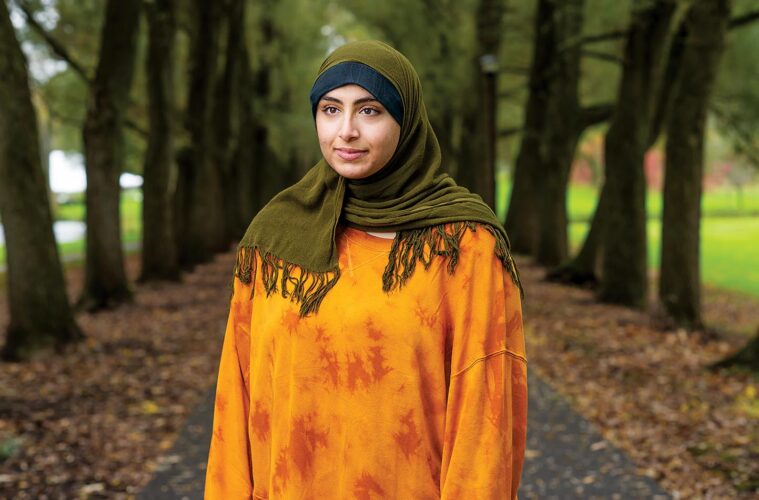Noha Shahba ’24 reflects on her gap year.
Nice veins.” That’s the first thing Noha Shahba ’24 said to her roommate when they met in the fall.
Having worked as a phlebotomist throughout the previous academic year, initially in New York City and then in her home state of Colorado, Shahba has an unusual comfort level with all things related to blood. But that wasn’t always the case.
She’d decided, when campus shut down due to COVID-19 in spring 2020, that she would take time off from Colgate and dedicate herself to helping others as the world continued to struggle with the global health crisis. During that time working in hospitals — as the pandemic worsened — Shahba received a very different education.
The opportunity arose when Shahba’s rowing teammate, Alex Hopkins ’23, also decided to take a gap year and was planning to live in New York City, where her parents have an apartment. Shahba, who has long been considering a career in health care, reached out to Jon Sendach ’98, executive director of North Shore University Hospital at Northwell Health. He helped her get an interview at Lenox Hill Hospital (owned by Northwell) on Manhattan’s Upper East Side.
Shahba underwent intense training at the hospital for three weeks, instead of the usual six. “With everything being so hectic, [my manager] needed me on the floor,” she says. Facing trial by fire, Shahba drew blood from 16–20 patients an hour, beginning at 5 a.m.
She alternated working full days in the COVID-19 unit with shifts on other floors. From PPE shortages to witnessing death regularly, Shahba endured a number of difficulties. “The first time I saw a patient die, I was not mentally prepared for it,” she says. “You don’t have an emotional connection to them, but it’s still hard. And when you do build emotional connections with some of them, it’s even harder.”
The tense environment strained Shahba and those around her; she encountered mistreatment by overworked coworkers and aggressive patients. “I had COVID patients spit on me,” she says. It’s no wonder that she and Hopkins both caught serious cases of the virus by Thanksgiving 2020. “It was scary dealing with COVID on our own.” It took six months for them to fully recover.
Beyond her own challenges, Shahba had a front-row seat to the inequities of the health care system. “It’s insane how the resources are distributed,” she says. While the hospital where she worked dealt with the same shortages as everyone else, other hospitals where friends worked didn’t even have basics like Band-Aids because of funding. And within the hospital where Shahba worked, she heard COVID-19 patients say they’d rather die than go into debt paying for a ventilator.
After nine months and 3,584 patients, Shahba needed a change from New York City. “There was no nature, and that really took a toll on my mental health, because my stress relief is hiking and being outside.” She moved home to Colorado and accepted a lead phlebotomist position. For two months, Shahba worked 75 hours a week and sometimes overnights, but the comfort of being near her family and the mountains helped.
“I was very much ready to come back to Colgate by the end of it,” Shahba says. The stressors she recalls from her first year as a college student now seem insignificant.
“I have a better appreciation for life,” says Shahba, who is still considering a career in health care. “It made me more grateful. And not many people are given the privilege of having an experience that helps them grow so quickly.”

